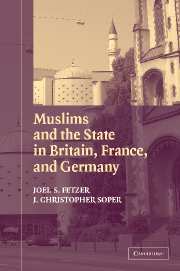Book contents
- Frontmatter
- Contents
- List of Figure and Tables
- Preface
- 1 Explaining the Accommodation of Muslim Religious Practices in Western Europe
- 2 Britain: Establishment Religion and Islamic Schools
- 3 France: Laïcité and the Ḥijāb
- 4 Germany: Multiple Establishment and Public Corporation Status
- 5 Public Attitudes toward State Accommodation of Muslims' Religious Practices
- 6 Integration and Muslim Practice
- Appendix: Survey Characteristics
- Glossary of Non-English Terms
- Bibliography
- Index
5 - Public Attitudes toward State Accommodation of Muslims' Religious Practices
Published online by Cambridge University Press: 05 September 2012
- Frontmatter
- Contents
- List of Figure and Tables
- Preface
- 1 Explaining the Accommodation of Muslim Religious Practices in Western Europe
- 2 Britain: Establishment Religion and Islamic Schools
- 3 France: Laïcité and the Ḥijāb
- 4 Germany: Multiple Establishment and Public Corporation Status
- 5 Public Attitudes toward State Accommodation of Muslims' Religious Practices
- 6 Integration and Muslim Practice
- Appendix: Survey Characteristics
- Glossary of Non-English Terms
- Bibliography
- Index
Summary
May I suggest that the last thing our society needs at this moment is more schools segregated by religion? Before 11 September, it looked like a bad idea; it now looks like a mad idea.
Tony Wright (2001)My country, France, my fatherland, is once again being invaded, with the blessing of our successive governments, by an excessive influx of foreigners, notably Muslims, to which we are giving our allegiance…. From year to year we see mosques sprout up pretty much everywhere in France, while church bells are becoming silent because of a lack of priests.
French actress and animal-rights advocate Brigitte Bardot (Agence France Presse 1996)How family, friends, neighbors, and colleagues react to the announcement “Praise God, I'm a Muslim!” depends on their educational level and kindheartedness, but above all else [also] on their own religiosity.
Murad Wilfried Hofmann (1996:185), German diplomat and convert to IslamIntroduction
the previous chapters have analyzed the conditions under which the British, French, and German states have accommodated the religious needs of Muslims. Our focus has been on how the inherited church–state model unique to each country has structured public policy. In this chapter, we turn our attention from political institutions and their impact on policy to an analysis of mass-level public attitudes toward state accommodation of Muslim religious practices.
In functioning democracies such as those studied in this book, elites ignore mass opinion at their electoral peril.
- Type
- Chapter
- Information
- Muslims and the State in Britain, France, and Germany , pp. 130 - 145Publisher: Cambridge University PressPrint publication year: 2004

